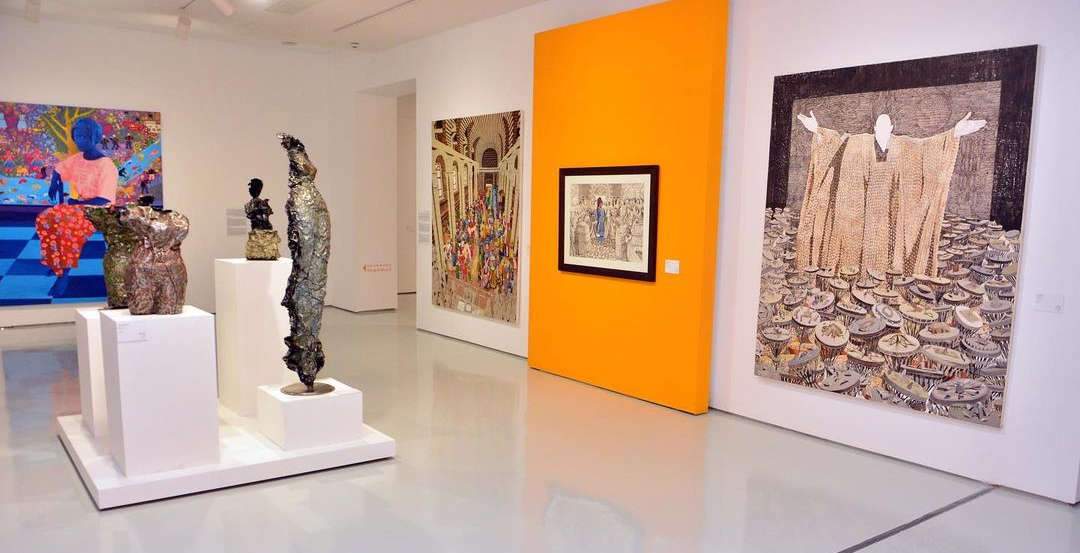For the first time in history, Benin is participating in the Venice Biennale: the African country unveiled the terms of its participation today. The Republic of Benin will thus be at the 60th International Art Exhibition, scheduled from Saturday, April 20 to Sunday, Nov. 24, 2024, with an exhibition titled Everything Precious Is Fragile: the aim of the exhibition is to trace Benin’s history by delving into themes such as the slave trade, the figure of the Amazon, spirituality and the Voodoo religion. It will also delve into contemporary reality by recounting the Gèlèdé thought, centered on the concept of rematriation: a feminist interpretation of the idea of “restitution,” not only related to objects, but also referring to a return to the philosophy and ideals of this land prior to the colonial era.
Curator Azu Nwagbogu and his team, consisting of curator Yassine Lassissi and set designer Franck Houndégla, have selected four major artists who will represent Benin at the Art Biennale 2024: Chloé Quenum, Moufouli Bello, Ishola Akpo, and Romuald Hazoumè.
Four themes, as mentioned: slavery, the figure of the Amazon, the Gèlèdé philosophy and the Voodoo religion. Uniting these themes is the common thread of African feminism and, specifically, Beninese feminism . Gèlèdé spirituality, represented through the use of masks, symbolizes the spiritual power of mothers in Beninese society, while the iconic subject of the Amazon brings to mind the political and military power enjoyed by women during the time of the Danxome reign. Analyzing the history of the slave trade also reveals the fundamental role of women in the struggle against slavery: they fought back courageously, defending their own freedom. Finally, the study of the Voodoo religion highlights the crucial contribution of women both as priestesses and as worshippers. As José Pliya, commissioner of the pavilion, states, “Benin will thus participate in the great ’appointment of giving and receiving,’ to quote Léopold Sédar Senghor.”
The decision to take part in the 2024 Art Biennale is also connected to the recent restitution in 2021 of 26 treasures taken from the royal family at the time of the French colonization of the Danxome kingdom. In the wake of this event, the exhibition Art du Bénin d’hier et d’aujourd’hui, de la restitution à la révélation (“Art of Benin of Yesterday and Today, from Restitution to Revelation”), staged in the capital city of Cotonou and currently being repurposed in several countries, set the stage for Benin’s participation in the 60th Venice Biennale.
The Benin Pavilion at the Art Biennale 2024 is managed by the Agence de développement des arts et de la culture (ADAC, the Beninese agency for the development of art and culture) on behalf of the Beninese Ministry of Tourism, Culture and the Arts.

Moufouli Bello. A lawyer converted to art, Moufouli Bello has chosen artistic language as a means of exploring identities and social constructs. A young exponent of the visual and digital arts, she trained at Le Fresnoy - Studio National des arts contemporains and is currently pursuing a PhD in the field of visual arts. She is best known for her figurative paintings: large-scale portraits depicting female figures in brilliant hues against bright blue backgrounds.
Chloé Quenum (Paris, 1983). After graduating from the École nationale supérieure des beaux-arts de Paris in 2011, Chloé Quenum studied Anthropology of Writing at the École des hautes études en sciences sociales (EHESS). Her work addresses political, social and ecology-related issues.
Ishola Akpo (Benin, 1963). He is a visual artist who experiments with different mediums combining tradition and modernity to bring to life a variety of metaphors. The boundary between reality and fiction, between fixed and multiple identities, remains the focal point of his work.
Romuald Hazoumè (Benin, 1962). Appreciated worldwide for his masks, made from used plastic gasoline cans, Romuald Hazoumè is a socially engaged artist; his works are firmly rooted in the socio-political and cultural context of Benin and the globalized world. Hazoumè’s masks convey a powerful message, depicting jerry cans as truly iconic objects of Porto Novo, while his installations are always dense with meaning and reveal deep insights into the world.
José Pliya (Commissioner). A scholar, playwright and theater director, José Pliya is in charge of tourism, arts and culture on behalf of the President of the Republic of Benin.
Azu Nwabogu (Curator). Founder and director of the African Artists’ Foundation - Lagos, Nigeria and founder of the LagosPhoto Festival.
Yassine Lassissi (Curatorial Team). Director of the Visual Arts Department at the Agence de développement des arts et de la culture (ADAC) and art historian.
Franck Houndégla (Curatorial Team). A scenographer and designer with a doctorate in architecture, he specializes in the creation of exhibitions and the design of museums, performance venues and living spaces.
 |
| Slaves, amazons and voodoo rites: Benin's first time at the Venice Biennale |
Warning: the translation into English of the original Italian article was created using automatic tools. We undertake to review all articles, but we do not guarantee the total absence of inaccuracies in the translation due to the program. You can find the original by clicking on the ITA button. If you find any mistake,please contact us.